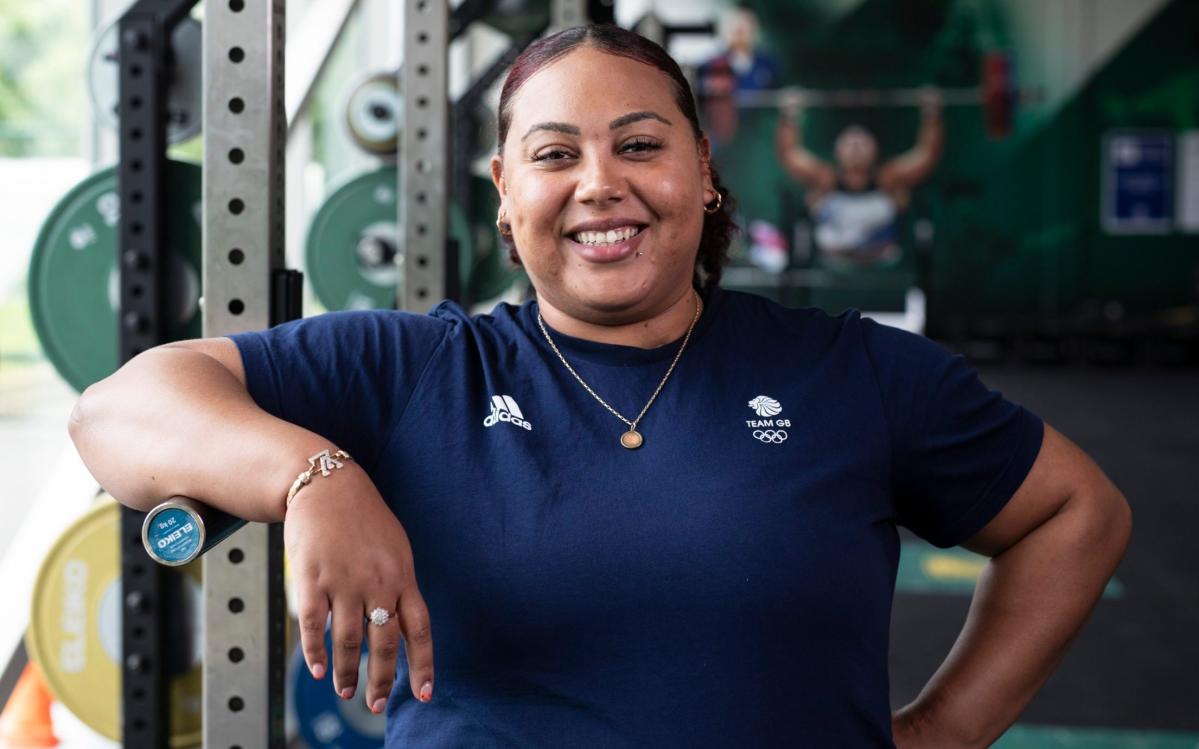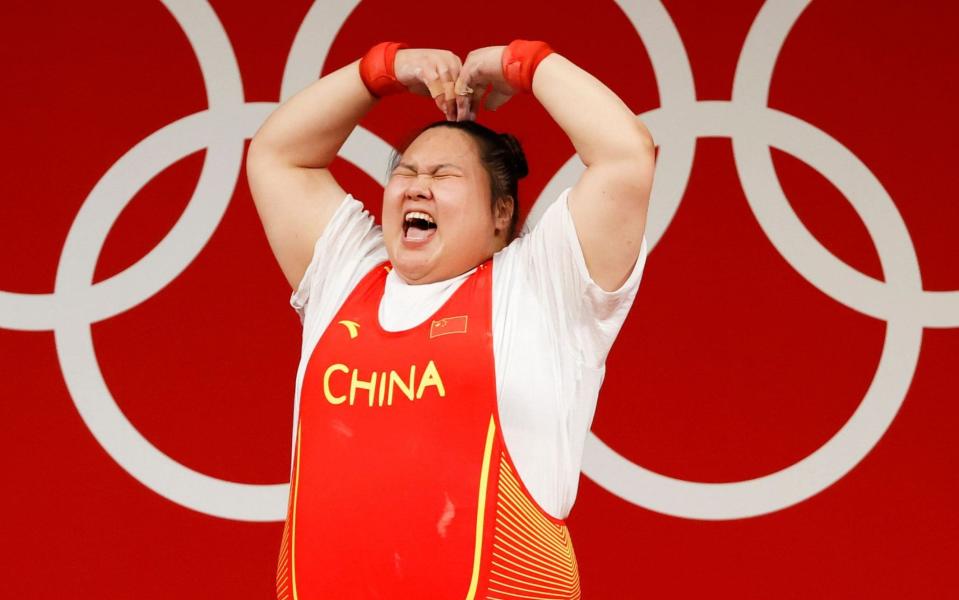Sports
Emily Campbell interview: ‘It is refreshing to see girls queuing for squat racks’

Click here to view this content.
Emily Campbell sips on a smoothie inside the University of Nottingham gym, watching the scores of students file past on their way to end-of-year exams in the nearby sports hall. Most of them are seemingly unaware that they are walking past Britain’s most successful weightlifter of modern times.
Campbell is Great Britain’s sole weightlifting representative at the Paris Olympics and she has had to wait for her chance to perform, going in the last category on the final day of the Games on Sunday morning. Yet the bubbly 30-year-old, who wrote her name into the history books at the Tokyo Games when she won a silver medal in the 87kg+ category three years ago, is not daunted by the prospect of flying the flag for the sport by herself. Rather, she is relishing the thought of what she terms a “proper Games experience” after celebrating her career-changing silver in an empty arena at the Covid-hit event.
“I went into Tokyo under the radar,” she says. “I didn’t have a massive social media following and people didn’t know who I was. Now I’m potentially going into the Games as a poster girl. It’s been very 360, but it’s good.”
Campbell, who self-funded her way to Tokyo, is used to going it alone. After striking silver she found her calling as a natural spokesperson for body positivity and in an age where it is all too easy for young girls to buy into warped beauty standards on social media, the Nottingham native has been busy evangelising one important message: that big is beautiful.
Having reported an uptick in the number of brands who want to do business with her, she believes that society is starting to embrace plus-sized bodies and more importantly, bigger sportswomen. Red-carpet appearances and invitations to industry events followed in the wake of her Tokyo success but Campbell’s personal highlight has been marvelling at the blown-up image of her on the side of NatWest’s headquarters near London’s Liverpool Street station.
“I actually went to see it myself but I didn’t want to be that weird girl trying to take a selfie in front of my own picture,” laughs Campbell. “But it’s been amazing. I’ve seen billboards of me cleaning and jerking in the middle of Paddington Station. The other night I was doing my shopping in Aldi and I saw the photo of us all as Team GB ambassadors and I tried not to scream while I was at the till. I had a really humble upbringing, so to see myself achieve those kinds of things is really special.”
Campbell takes great pride at being raised on Snape Wood estate in the Nottinghamshire town of Bulwell, where she grew up with her decorator father, Trevor, mother Lynda and sister Kelsie, a swimmer who competes for Jamaica. Incredibly, she only started weightlifting in 2016 during her student days at Leeds Beckett University to improve her strength as a shot putter, but ended up discovering a new superpower.
The road to her first Olympics was a bumpy one. Campbell had to raise £10,000 to enter qualifying competitions to secure her place after British Weightlifting lost its UK Sport funding in the wake of the 2016 Rio Games. Having put the sport back on the map in Tokyo, the road to Paris has been a lot more enjoyable.
She has recently bought her first house and has witnessed first-hand the weight-training revolution among women that is sweeping across the UK. Data from Sport England shows the number of women weightlifting or powerlifting since the launch of its Active Lives survey seven years ago is at an all-time high, with 1.4 million participating in either activity at least once in the past year. Numbers predictably took a hit during the pandemic with a lack of access to fitness and leisure centres but recovered quickly. The hashtag #strongnotskinny also has 9.4 million posts and counting on Instagram.
“I am a little bit blind to what goes on commercially as I spent a lot of time in weightlifting gyms but sometimes when I’m in London I’ll go to places like GymBox where you can do weightlifting,” says Campbell, a huge grin spreading across her face.
“I remember going to the one in Stratford and the girls were queuing for squat racks. That was a real full circle moment because I thought, ‘Normally this place would be empty’ but the girls are fighting to be there. They’re lifting heavy too. A lot of them are talking about fuelling properly, eating proper food and training properly.
“If you want to have a big bum and abs you’ve got to lift heavy but you’ve got to eat properly too. I think it’s really refreshing that we’re moving in that direction now. I’m not trying to say that cardio is bad – the heart is the strongest muscle in the body and it’s got to be fit and healthy. But it’s about that combination of training. You can have a bit of everything in your programme and it’s good for you.”
Click here to view this content.
Campbell has made personal tweaks to her programme too. She recently decided to come off all hormonal contraception because she needed her body “to be as natural as possible while I was putting it through what I was putting it through”. She has also welcomed leading performance nutritionist Dr Sinead Roberts into her predominantly male entourage. Campbell, who consumes around 4,200 calories a day to stay on the top of her game, says: “I was having a bit of a moment with my weight – it had gone up quite suddenly without increasing my eating – and she managed to stable everything out and give me that confidence again.”
There is no doubt Campbell is in the shape of her life. Earlier this year she soared to her fourth European title, overcoming a late adductor injury in the build up, to add to her Commonwealth title she won in 2022. She is accepting of the fact that Olympic gold might elude her again this summer given the small matter of Li Wenwen, China’s 24-year-old reigning Games champion who is the nailed-on favourite to retain her title, although recent events have given her cause for optimism.
Wenwen’s cloak of invincibility evaporated when she missed her first two snatch attempts after injuring her elbow at last year’s World Championships in Riyadh. She declined the third and withdrew. To Campbell, who describes her Chinese rival as a “generational talent”, it is a reminder that a medal of any colour in Paris is not a foregone conclusion.


“We’re starting to see a lot more cracks in the Chinese now than before,” says Campbell, matter-of-factly. “I wouldn’t say that they’ve got it completely sewn up this time. Most athletes are already done by the time the Chinese enter their first attempts, so they have control of the time and control of the clock and a nice peaceful warm-up. Now that there are other athletes who are getting closer to them, they’re having to make decisions, to compete and react. They’re not used to being put under pressure.”
As for how long she aims to continue in the sport, Campbell says: “I don’t know. I love it. I’d love to keep going for as long as possible. There’s a woman in the Solomon Islands who’s just qualified and she’s been at every single Olympics since the women have been in it. She’s done six Olympic Games.
“Women were only allowed to lift in the Olympics since 2000 – a lot of people don’t know that. We’re one of the oldest Olympic sports for men but women were only introduced into the Olympic programme 24 years ago.”
Self-expression is equally important to Campbell, who became an instant hit with her striking red-and-blue hair neatly tied into buns at Tokyo (she signed a deal with a well-known hair dye brand soon after) and fake eyelashes. She is still pondering her hairstyle for Paris, where one of her biggest concerns is sourcing a good braider.
She is also undecided on whether she should embellish the Olympic rings inside her biceps. “Everyone asks if I’m going to add some stuff to it,” she says. “I might just get this one brightened…the simplicity of the Olympics rings is enough.”
Whatever she chooses, Campbell is ready to light up the weightlifting world – again.
A version of this interview was first published on June 20, 2024.







